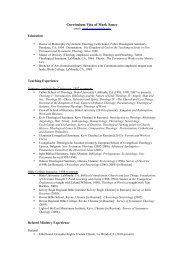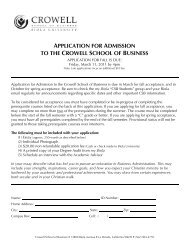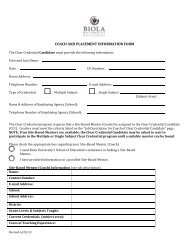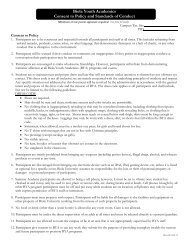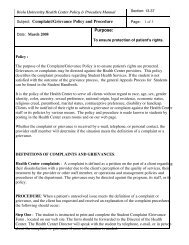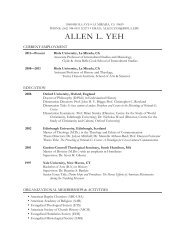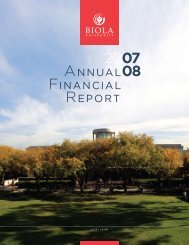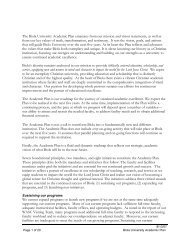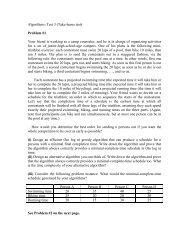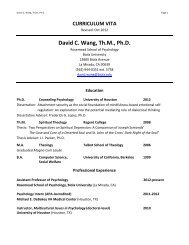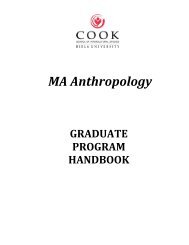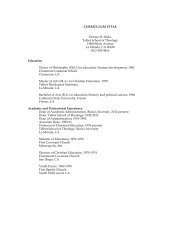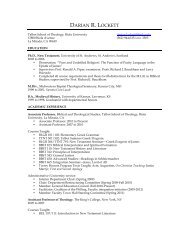Create successful ePaper yourself
Turn your PDF publications into a flip-book with our unique Google optimized e-Paper software.
Gendlin, and selected existential therapists. Prerequisites: RSPY<br />
515; permission of instructor. Elective.<br />
rslb 715 Current Psychotherapies ......................................................3<br />
This course focuses each time it is offered on a specific thera-<br />
py not regularly included in Rosemead’s curriculum. Teaching<br />
personnel are drawn from the professional community of<br />
active practitioners of the specific modality to be considered.<br />
Prerequisite: Permission of instructor. Elective.<br />
rslb 717 Gestalt Psychotherapy ..........................................................3<br />
The focus of this course will present the theory and applica-<br />
tion of Gestalt therapy for use with individuals and groups.<br />
This therapy, created by Perls and developed by Zinker &<br />
Polster, focuses on personal growth and self-actualization.<br />
Prerequisite: Permission of instructor. Elective.<br />
rslb 718 advanced Gestalt ....................................................................3<br />
This course is open to students who have completed RSLB<br />
717 and focuses on the application of Gestalt therapy and<br />
techniques to group psychotherapy. Enrollment is limited and<br />
the permission of the instructor is required. Elective.<br />
rslb 725 multigenerational Therapy ..................................................3<br />
The course focuses particularly on family-of-origin theories<br />
and practical approaches that share both an attention to<br />
family dynamics across three or more generations and a<br />
history in psychodynamic theory. A videotape series will be<br />
used to demonstrate conduction transgenerational sessions<br />
with clients. Students will also apply experientially these<br />
theories to their own family of origin. The lab segment will use<br />
Williamson’s family-of-origin group therapy model where co-<br />
therapy teams will help clients achieve the goal of develop-<br />
ing an authentic self within the original family. Prerequisite:<br />
Permission of instructor. Elective.<br />
t h e o l o G y / b I b l I C a l s t U d I e s ( r s t h )<br />
This series of courses provides students with essential biblical and<br />
theological understanding prerequisite to effective integration of the<br />
disciplines of psychology and theology. (17 units required.)<br />
rsth 521 Theology i: revelation, Theology-integration<br />
& the nature of God ...............................................................4<br />
This course is designed to integrate traditional themes and<br />
categories in systematic theology with psychology and<br />
spiritual formation. An exploration into the nature, method<br />
and rationale of Christian theology interfaced with the practi-<br />
cal emphasis on spiritual theology, which has as its end the<br />
love of God. Emphasis is given to a study of revelation, both<br />
general and special, inspiration, canonicity and illumination<br />
of Scripture in the life of growth. Attention will also be given<br />
to the nature of theology, spiritual theology and their meta-<br />
integration with the manifold creation disciplines (psychology,<br />
sciences, arts, humanities etc.). Particular attention given to<br />
the doctrine of God, his existence, attributes, Trinitarian nature<br />
and knowledge of God in the light of the believer’s deep be-<br />
liefs of the heart and unconscious theology which may hinder<br />
spiritual growth. Attention is also given to biblical interpreta-<br />
tion, study, mediation and psychological issues involved in its<br />
application to life. Required of Psy.D., Ph.D.<br />
rsth 522 Theology ii: Works of God, Wisdom,<br />
humankind & sin ....................................................................3<br />
An investigation into God’s eternal plan including his king-<br />
dom purpose and redemptive focus, His work of creation and<br />
continued activity with creation, angels both good and evil<br />
including their origin, present state, work and destiny. This<br />
also involves an in-depth discussion of natural law, integration<br />
and the wisdom of God evident in the works of God (OT<br />
wisdom literature). Particular emphasis is given to the creation<br />
of humans in God’s image, human nature, the fall and effects<br />
of sin upon humanity, human life in relation to the divine in-<br />
stitutions of the family and civil government as this interfaces<br />
Spiritual Theology, integration and the end of loving God.<br />
Required of Psy.D., Ph.D.<br />
rsth 603 Theology iii: Christ, salvation & the spirit ......................4<br />
An investigation into the person and saving work of Christ,<br />
particularly the nature and application of salvation and their<br />
relation to spiritual formation. Attention is given to the person<br />
and ministry of the Holy Spirit, particularly as it relates to His<br />
indwelling ministry within the psychological dynamics of the<br />
human soul. Special emphasis on the practice of sanctification<br />
in personal Christian living. Required of Psy.D., Ph.D.<br />
rsth 604 Theology iV: The Church & eschatology .........................3<br />
The study of the broad kingdom purpose of God and the<br />
future events related to the destiny of history and individuals<br />
including Christ’s coming in its phases, the millennial reign of<br />
Christ, the resurrections, the judgments and eternal state. Em-<br />
phasis will also be given to their relevance to spiritual forma-<br />
tion and human guilt, anxiety and repression of these realities.<br />
The inception and nature of the church as the new kingdom<br />
community, both as a living organism and an organization, its<br />
function, ordinances and place and mission in God’s purpose<br />
and human happiness. Required of Psy.D., Ph.D.<br />
rsth 625 Theology V: Christian ethics ................................................3<br />
An introduction to ethics including the nature of personal<br />
character, virtues and vices, and their relationship to the spiri-<br />
tual disciplines as means of spiritual growth into the image<br />
of Christ. Attention is given to understanding the personal<br />
dynamics involved in good and bad character in light of sin,<br />
common grace, religious defenses and the Spirit-infused vir-<br />
tues of faith, hope and love transforming the so called “natural<br />
virtues.” Particular emphasis is given to an introduction to the<br />
spiritual disciplines and their role in Christian spiritual forma-<br />
tion and the development of virtue. Attention also given to<br />
20<strong>05</strong> – 20<strong>07</strong> C ATA LO G Rosemead School of Psychology 283



